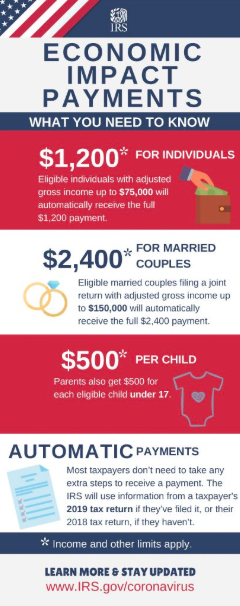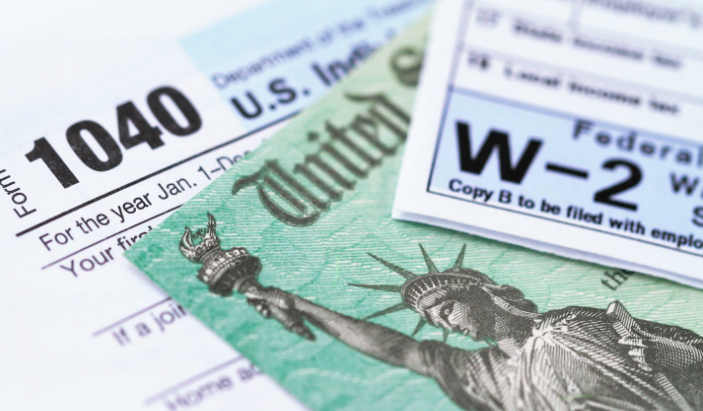UWL students comment on not receiving federal stimulus checks
April 28, 2020
In March of 2020, the U.S. Government passed the Coronavirus Aid, Relief, and Economic Security [CARES] Act, to send American taxpayers Economic Impact Payments, commonly known as stimulus checks, to help with financial hardships during the COVID-19 outbreak.

The stimulus checks are delivered at different times and vary from household-to-household. An individual’s most recent tax filing is used to determine eligibility for the relief package: single filers who earned less than $75,000 receive a $1,200 stimulus check and married, jointly-filed households receive a $2,400 stimulus check with an extra $500 for each qualifying dependent claimed. Only children 16 years and younger qualify for the $500 dependent claim.
Individuals 17 years and older who are filed as dependents are disqualified from receiving a stimulus check. Not only is age a qualifying factor, but high-income earners and non-citizens are also disqualified to receive an Economic Impact Payment.
This set of disqualifications has presented opportunities for financial hardships among college students who are filed as dependents.
Freshman at the University of Wisconsin-La Crosse, Lauren Nash, has moved to her home town for the time being due to COVID-19 restrictions. Although she was filed as a dependent and didn’t receive a stimulus check, Nash was able to maintain her job at her hometown grocery store.
“I still have a job, so I have a little bit of income right now that’ll help me,” said Nash. “I know I am really lucky, and some haven’t been able to keep any hours.”
Although Nash has been able to keep her job, she has had reduced weekly-hours in order to maintain focus on the remainder of the semester, as well as from ordered COVID-19 restrictions.
“I am just not working as much as I was or making the money I thought I would be making,” said Nash.
She says, because of her reduced income, she is worried about covering tuition, groceries, and bills next year. Thus, receiving a stimulus check would’ve helped her with those essentials.
“I’m taking online classes over the summer, so I could’ve put it towards that, bills, or just saved it as a sort of safety net,” said Nash.
Freshman at UWL, Haley Durst was also filed as a dependent, so she also did not receive a stimulus check.
Durst, who normally works at a bowling alley in her hometown over breaks during the academic year and summer months, stated she was relying on being able to go back to work, but is now left without any income due to the closing of dine-in bars and restaurants.
Durst has moved back to her home after living in UWL’s dorms, and said while she hasn’t faced any financial hardships yet, she is concerned about making ends meet when her rent begins in June.
“I don’t know what I’m going to do if I can’t work,” said Durst. “Rent is really only one part too. I’ll still need groceries and extra money for other bills and expenses.”
She stated receiving a stimulus check would’ve helped eliminate some stress about her payments in the upcoming months.
“I would’ve been able to not worry about rent, or what I am doing next semester for tuition, groceries, or whatever else may come up,” said Durst.
Karcher had planned on waiting to find employment but instead has found a job as a summer nanny, which provides her with a source of income.
“I knew I needed to find work this summer and thought it was going to be a challenge to find a job because everything is closed, but I got lucky and was able to find work,” said Karcher. “Now I am working half days, doing schoolwork with the kids, and then completing my own classes afterward.”
She says that if she would’ve qualified to receive a check, she could’ve waited longer to get a job, focus on her studies, and wouldn’t have to worry about making payments.
“I, as a college student, I take anything I can get,” she said. “It definitely doesn’t hurt to get that boost.”
Nash, Durst, and Karcher all stated college students should’ve received some sort of help from the government in the midst of the COVID-19 outbreak.
“I think it is helpful to anyone to receive help in paying for their education, especially during a pandemic. It just leaves one less thing to stress about during this time,” said Karcher. “Instead of these students worrying about paying for their education, groceries, [or] rent, they should be able to focus on learning to the best of their ability with online classes, as well as staying safe and healthy, preventing the spread of COVID-19.”
“I think we [college students] are the ones that are the most financially unstable and are already worried about money and how to pay for tuition and bills,” said Durst. “I don’t know what we are going to do now.”
For information on Economic Impact Payments visit, https://home.treasury.gov/policy-issues/cares. For emergency resources visit, https://www.uwlax.edu/student-life/emergency-resources/. For resources on rent payments visit, https://www.uwlax.edu/globalassets/offices-services/it-make$-cents/rent-resources-guide-2.pdf.






